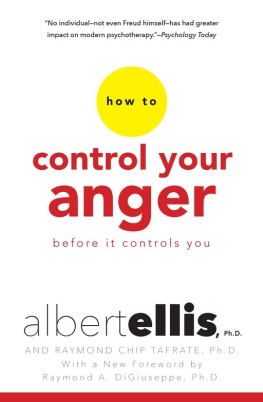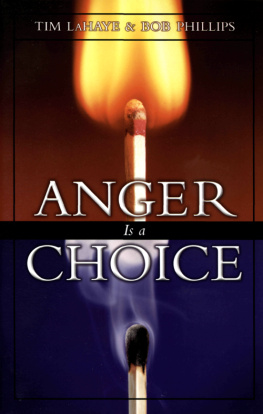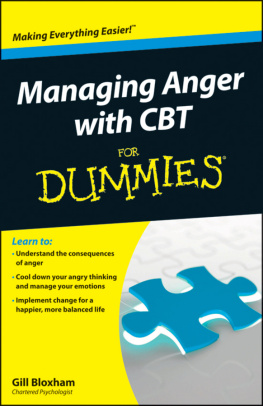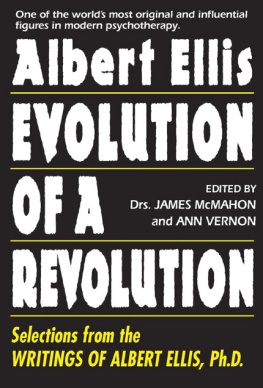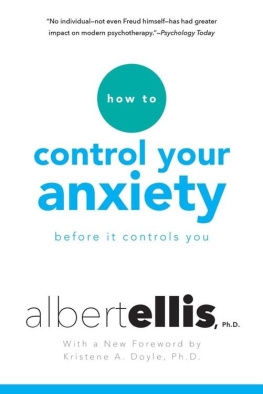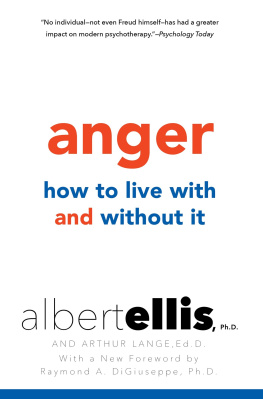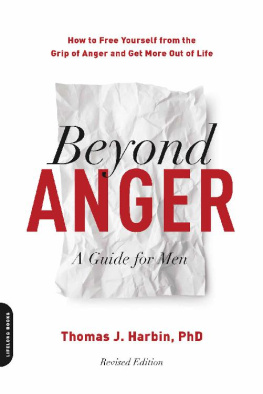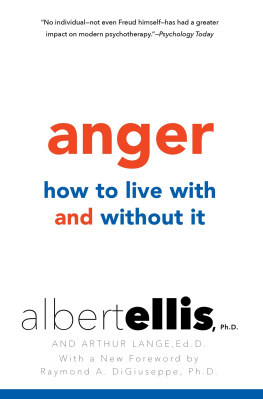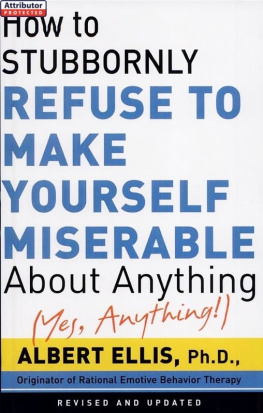A LSO BY D R . A LBERT E LLIS
How to Control Your Anxiety Before It Controls You
How to Stubbornly Refuse to Make Yourself Miserable
About Anything (Yes, Anything)
How to Stop Destroying Your Relationships
How to Keep People From Pushing Your Buttons
Anger: How to Live With It and Without It
The Albert Ellis Reader
Reason and Emotion in Psychotherapy
Available from the Citadel Press/Kensington Publishing Corp.
Foreword
I F YOU ARE READING THIS , chances are that either you or someone you know has an anger problem, and you are hoping that you will find some answers to help with the anger.
Authors of self-help books try to distill the existing knowledge about a psychological problem so that it fits in one book, and they suggest strategies that can overcome the problem based on knowledge about treatments that work. The best self-help books take what we know from science and make it understandable to the public. The authors of this book are extremely qualified to do just that.
Dr. Albert Ellis was a world-famous leader in psychotherapy and a pioneer in the development and use of self-help materials and books. He believed in giving people the tools and resources to become their own therapists. This book reflects his lifelong efforts to help people change themselves. I had the honor of working with Al from 1975 until his death in 2007. He was a truly inspirational person who changed the face of psychotherapy. Together, Al and I trained thousands of psychotherapists from all over the world.
Chip Tafrate came to study with Al and me at the Albert Ellis Institute in 1995. He has gone on to become a world leader in the field of anger and anger management. He and I have collaborated on many scientific papers as well as a professional book, and together we developed two psychological tests to measure disturbed anger. As his past supervisor, I am proud that he has had such a successful career and that he teamed up with Al to produce such a fine book. Knowing them, it is clear to me that they are the perfect authors to write a self-help book on anger.
Several problems faced Drs. Ellis and Tafrate when they decided to write this self-help book on anger. Surprisingly, science knows much less about anger than it knows about other emotional problems, simply because there are fewer research studies on treating anger than there are on treating other emotional problems.
Because of this state of affairs in the science of anger, peopleincluding psychotherapistsoften hold many myths about the subject. It is common to come across people with anger problems who believe things about their anger or the expression of their anger that are not only false but actually make their anger worse. It is just as common to encounter psychotherapists who base their treatments on these common myths about anger.
We also know that if you suffer from another primary psychological problem in addition to anger problems, your primary problem will be more severe and be less responsive to treatment. This book will help you even if anger is not your most serious problem.
The treatment created by Drs. Ellis and Tafrate evolved from a two-thousand-year-old set of principles. Their form of therapyRational Emotive Behavior Therapy (or REBT)shares many principles with early Greek and Roman philosophers, especially those known as the Stoic philosophers. The oldest and perhaps one of the most influential books on the subject has to be the book On Anger by the Roman Stoic philosopher Seneca, who lived more than two thousand years ago and was tutor to the emperor Nero. The introduction to Senecas ancient text sums up the purpose of this book:
We are here to encounter the most outrageous, brutal, dangerous, and intractable of all passions; the most loathsome and unmannerly; nay, the most ridiculous too; and the subduing of this monster will do a great deal toward the establishment of human peace.
My purpose is to picture the cruelty of anger that not only vents its fury on a man here and there but also renders in pieces whole nations.
Drs. Ellis and Tafrate will help readers subdue their destructive anger and lead them to establish peace in interpersonal relations.
Thus, this book starts with a principle of anger management from more than two millennia ago; however, the work of Seneca has often been overlooked or forgotten by modern psychotherapists. Ellis and Tafrate have combined these ancient insights with the best that modern science and psychotherapy has to offer on controlling anger.
Several things that science has learned about anger as an emotion make it a difficult problem to change. Anger is the only negative emotion that people all over the world usually want to keep. When people do wish to change their anger, their motivation for change is weaker and more fleeting than their motivation to change other negative emotions.
No one wants to stay depressed, anxious, disgusted, or guiltybut people often want to remain angry. This represents a very important difference between anger and other troublesome emotions. As a result, this book will help readers understand the negative consequences of their anger and recognize how it blocks them from reaching their goals and poisons their interpersonal relationships.
Another major difference between anger and other emotions results in what we call the angry persons paradox. When we experience depression, guilt, shame, or anxiety, we usually upset ourselves about something that we think we did or some characteristic we have that we think is the cause of our disturbed emotion. As a result we try to change ourselves. However, anger usually involves the externalizing of blame. When we become angry, we usually consider the source of our anger to be outside ourselves. We would not be angry if other people did not do the stupid things they do. If we think the causes of anger are outside ourselves, the solution to our anger problems appears to us to be changes other people have to make. If the external cause of our anger is not going to change, we remain trapped in our rage.
That other person who acted so stupidly to trigger our anger is not going to read this book. They will keep on acting badly. They are most likely not willing to change. This book will teach readers the emotional choices that provide different and more adaptive responses to the difficult people they have previously allowed to trigger their anger. They will learn to behave adaptively with such difficult people and amid the hassles that we all encounter in daily life.
The work of Drs. Ellis and Tafrate has been a great inspiration to me both professionally and personally. They have taught me much about how to control anger. I am sure their book will be equally helpful to you, and in the tradition of Seneca, the principles and techniques in this book will help you find peace in your life.

